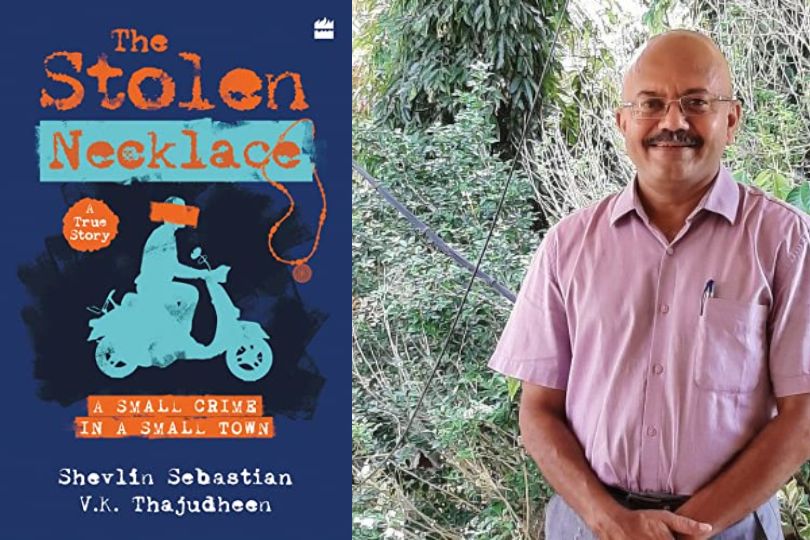Interview with Shevlin Sebastian, Author of “The Stolen Necklace”
The core event is a necklace being stolen. Then, a series of incidents ruined a family's mental peace, financial stability, and reputation. That is why we decided on the title of 'The Stolen Necklace.on Sep 15, 2023

Frontlist: The title "The Stolen Necklace" suggests a tangible object, but the book delves into deeper themes of justice, fairness, and the flaws in the legal system. How did you decide on this title, and what does it represent in the story?
Shevlin: The core event is a necklace being stolen. Then, a series of incidents ruined a family's mental peace, financial stability, and reputation. That is why we decided on the title of 'The Stolen Necklace.'
Frontlist: The book highlights the struggles of individuals wrongfully accused by law enforcement. Can you elaborate on how Thajudheen's story resonates with a more prominent issue within the Indian legal system?
Shevlin: One of the more prominent issues within the legal system is the proliferation of false cases. In Chapter 11, I examined this phenomenon. VK Thajudheen, the subject of 'The Stolen Necklace,' was one of the luckier ones. He spent 54 days in jail. But others have spent 8,10, and 12 years in prison before the courts exonerated them. The police are under pressure to solve cases quickly. So they resort to using false claims to 'solve' the cases. But the problem with this strategy is that the guilty ones escape unscathed.
Frontlist: Loneliness, uncertainty, and the erosion of humanity are depicted in Thajudheen's experiences in prison. How did you capture these emotions in your writing, and what effect did you aim to create in readers' minds?
Shevlin: I interacted closely and often with Thajudheen to get an idea of his thoughts, emotions, and feelings during that time. I felt the reader would better understand if Thajudheen revealed his innermost thoughts and emotional responses. I noted down all that he told me. I wanted the readers to understand the suffering of an innocent middle-class person who had never been to jail ever in his life before he was arrested. I wanted readers to feel empathy that the next time they read about a false case in the newspaper, they will understand precisely what the person went through.
Frontlist: What challenges did you face while collaborating with Thajudheen to tell his story authentically? How did you ensure his perspective and emotions came through in the narrative?
Shevlin: Initially, Thajudheen was finding it difficult to remember every important event. But over a period, as he got into the habit of telling me about his experiences, fresh memories and moments appeared before his eyes. The practice of constantly telling me his memories resulted in his mind opening up and allowing him to access many memories buried in his unconscious mind.
Frontlist: Your book exposes additional incidents of false arrests and the disparity between the pursuit of justice and the harsh misapplication of the law. How did you effectively gather the information and evidence to portray this systemic issue?
Shevlin: I did a lot of research on the Internet. I spoke to lawyers. And I combined the two and formed a narrative.
Frontlist: The book discusses the lasting impact of wrongful convictions on innocent individuals. Could you elaborate on how you conveyed the emotional and psychological toll this ordeal takes on those who are falsely accused?
Shevlin: I spoke to Thajudheen in depth over many months so that I could have a perceptive understanding of what he went through. I was lucky that Thajudheen could recount the events chronologically. So, it brought clarity to the story.
Frontlist: What key message do you hope readers will take away from "The Stolen Necklace"? How can awareness of wrongful convictions positively change the legal system?
Shevlin: I hope readers will realize that many false cases exist in India and abroad, too. So when a person is arrested, they should not immediately condemn him and think he is guilty. They should not ostracize him if they know him as a friend, colleague, or relative. It may be a false case. Only if a court convicts him can he be considered guilty.
Frontlist: As the author of this impactful book, what are your thoughts on how individuals, communities, and institutions can work toward reforming the legal system and ensuring that justice is served fairly?
Shevlin: Once people become aware of wrongful arrests, they can influence civil society, the media, and politicians to bring out changes so that police officers are charged if they set up false cases. They should be penalized, suspended, or even sacked. That will provide a good deterrent for the filing of false cases.
Frontlist: Reflecting on your journey of writing "The Stolen Necklace," what message or takeaway do you want readers to carry with them after finishing the book?
Shevlin: Bad luck can hit you at any time. Life is a series of random events. We think we are in control of life, but that is not the case. Life controls us. Anything can happen at any moment. You can only hope that a random event is good and not a tragedy.
We should be more aware of what is happening in society. Too many times, we live in a self-contained bubble and do not have a social attitude. We are self-absorbed and selfish. I hope 'The Stolen Necklace' will make readers aware of the tragedies that are taking place in Indian society with alarming regularity.

.jpg)
.jpg)
.jpg)
.jpg)
.jpg)
.jpg)

.jpg)
.jpg)
.jpg)
.jpg)

.jpg)

.jpg)
.jpg)










Sorry! No comment found for this post.